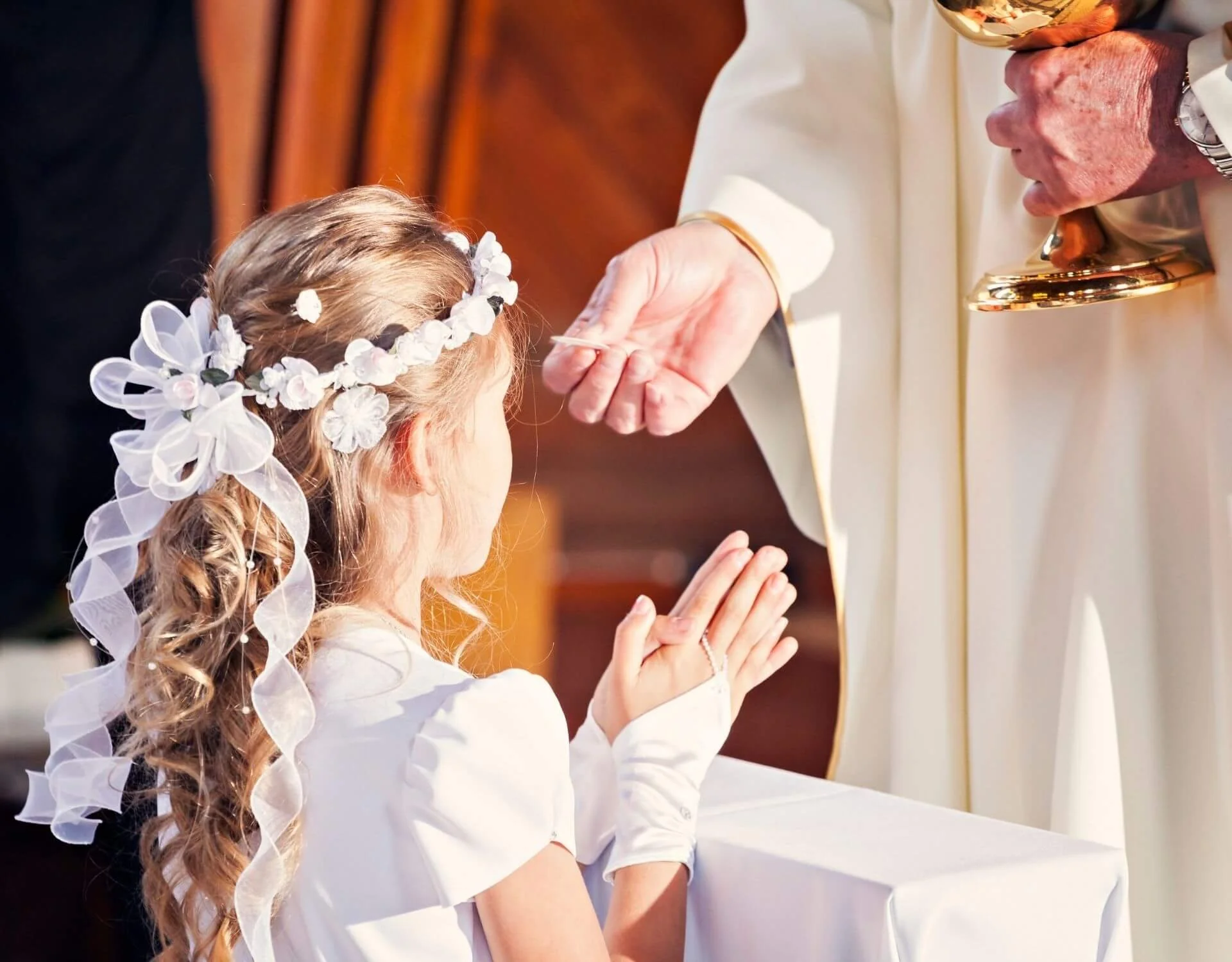Eucharist
The Source and Summit of our Catholic Faith
Partaking of the Bread of Life
The Holy Eucharist is the heart of our Catholic faith—the "source and summit of the Christian life." It is the most intimate encounter we have with Jesus on earth, for in this sacrament, the bread and wine are truly transformed into His Body, Blood, Soul, and Divinity. When we receive the Eucharist, we receive Christ Himself, who nourishes our souls, unites us to His sacrifice, and binds us together as His Church.
Scriptural Foundation: At the Last Supper, Jesus took bread, blessed and broke it, and gave it to his disciples, saying, "This is my body, which is given for you. Do this in remembrance of me." (Luke 22:19)
The Church Teaches: "The Eucharist is the source and summit of the Christian life. The other sacraments...are bound up with the Eucharist and are oriented toward it. For in the blessed Eucharist is contained the whole spiritual good of the Church, namely Christ himself." (Catechism of the Catholic Church, 1324)
Partaking of the Bread of Life
The Holy Eucharist is the heart of our Catholic faith—the "source and summit of the Christian life." It is the most intimate encounter we have with Jesus on earth, for in this sacrament, the bread and wine are truly transformed into His Body, Blood, Soul, and Divinity. When we receive the Eucharist, we receive Christ Himself, who nourishes our souls, unites us to His sacrifice, and binds us together as His Church.
Scriptural Foundation: At the Last Supper, Jesus took bread, blessed and broke it, and gave it to his disciples, saying, "This is my body, which is given for you. Do this in remembrance of me." (Luke 22:19)
The Church Teaches: "The Eucharist is the source and summit of the Christian life. The other sacraments...are bound up with the Eucharist and are oriented toward it. For in the blessed Eucharist is contained the whole spiritual good of the Church, namely Christ himself." (Catechism of the Catholic Church, 1324)
Preparing to Receive Christ
To receive the Eucharist is to receive Christ Himself. The Church asks us to approach this sacred gift with proper disposition, reverence, and preparation.
State of Grace: To receive Holy Communion, one must be in a state of grace. If you are aware of having committed a mortal sin, you must first receive the Sacrament of Reconciliation (Confession).
Eucharistic Fast: One must fast from all food and drink (except for water and medicine) for at least one hour before receiving Holy Communion.
Reverence: We show our belief in the Real Presence through our reverence. A simple bow of the head before receiving the Eucharist is a beautiful sign of this reverence.
First Communion at St. Ambrose Barlow
First Holy Communion is a blessed and joyful milestone in the journey of faith. It is the moment a baptized Catholic, having reached the age of reason, is first welcomed to the Lord's Table to receive the Eucharist. This sacred communion completes one's initiation into the Eucharistic life of the Church, uniting the soul to Christ in the most personal way imaginable.
For Children
Preparation for First Holy Communion is a one-year program, typically beginning at Year 3. Children must be baptized and will also prepare for and receive their First Reconciliation (Confession) before receiving First Communion.
For Adults
Baptized adult Catholics who have not yet received their First Communion are invited to join our Rite of Christian Initiation for Adults (RCIA) program to prepare for the sacrament.
Ask Us About It
For all inquiries about Confirmation and to register for RCIA, please use this form.
Frequently Asked Questions
-
Yes, absolutely. This is a core teaching of our faith. We believe that through the power of the Holy Spirit, the bread and wine are truly changed into the Body, Blood, Soul, and Divinity of Jesus Christ. This is not a symbol; it is the Real Presence of Christ Himself, as He taught: "I am the living bread... whoever eats this bread will live forever; and the bread that I will give is my flesh for the life of the world" (John 6:51).
-
To receive the Eucharist is to be in intimate union with Jesus, who is all-holy. St. Paul warns us to examine ourselves before receiving, "for anyone who eats and drinks without discerning the body eats and drinks judgment on himself" (1 Corinthians 11:29). The Sacrament of Reconciliation restores our state of grace, healing our relationship with God so we can receive Him worthily.
-
A spiritual communion is a prayer for those who cannot physically receive the Eucharist. It's an act of desire to unite your heart with Jesus, asking Him to come to you spiritually. It is a beautiful practice that brings many graces, especially when one is ill or unable to attend Mass (CCC, 1359).

The Holy Eucharist is the heart of our Catholic faith. It is not a mere symbol, but the true Body, Blood, Soul, and Divinity of our Lord Jesus Christ, present under the appearances of bread and wine. In this sacrament, Jesus gives Himself to us as spiritual food, nourishing our souls, uniting us intimately with Him, and strengthening us to live as His disciples in the world.
